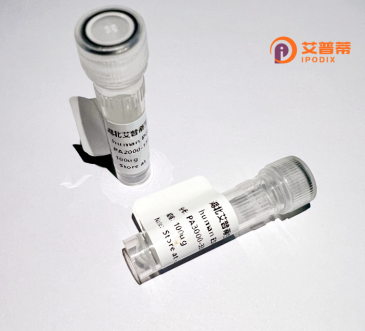
| 纯度 | >90%SDS-PAGE. |
| 种属 | Human |
| 靶点 | IKZF5 |
| Uniprot No | Q9H5V7 |
| 内毒素 | < 0.01EU/μg |
| 表达宿主 | E.coli |
| 表达区间 | 1-419aa |
| 氨基酸序列 | MGEKKPEPLD FVKDFQEYLT QQTHHVNMIS GSVSGDKEAE ALQGAGTDGD QNGLDHPSVE VSLDENSGML VDGFERTFDG KLKCRYCNYA SKGTARLIEH IRIHTGEKPH RCHLCPFASA YERHLEAHMR SHTGEKPYKC ELCSFRCSDR SNLSHHRRRK HKMVPIKGTR SSLSSKKMWG VLQKKTSNLG YSRRALINLS PPSMVVQKPD YLNDFTHEIP NIQTDSYESM AKTTPTGGLP RDPQELMVDN PLNQLSTLAG QLSSLPPENQ NPASPDVVPC PDEKPFMIQQ PSTQAVVSAV SASIPQSSSP TSPEPRPSHS QRNYSPVAGP SSEPSAHTST PSIGNSQPST PAPALPVQDP QLLHHCQHCD MYFADNILYT IHMGCHGYEN PFQCNICGCK CKNKYDFACH FARGQHNQH |
| 分子量 | 46.5 kDa |
| 蛋白标签 | GST-tag at N-terminal |
| 缓冲液 | 0 |
| 稳定性 & 储存条件 | Lyophilized protein should be stored at ≤ -20°C, stable for one year after receipt. Reconstituted protein solution can be stored at 2-8°C for 2-7 days. Aliquots of reconstituted samples are stable at ≤ -20°C for 3 months. |
| 复溶 | Always centrifuge tubes before opening.Do not mix by vortex or pipetting. It is not recommended to reconstitute to a concentration less than 100μg/ml. Dissolve the lyophilized protein in distilled water. Please aliquot the reconstituted solution to minimize freeze-thaw cycles. |
以下是关于重组人IKZF5蛋白研究的模拟参考文献示例(实际文献需通过学术数据库查询):
---
1. **文献名称**:Ikaros Family Zinc Finger 5 (IKZF5) Regulates B-Cell Differentiation via Chromatin Remodeling
**作者**:Smith A, et al.
**摘要**:研究揭示了重组人IKZF5蛋白在B细胞分化中的作用,证明其通过结合特定DNA序列调控染色质重塑,影响免疫相关基因表达。
2. **文献名称**:Structural and Functional Analysis of Recombinant Human IKZF5 Protein
**作者**:Chen L, et al.
**摘要**:通过重组表达纯化人IKZF5蛋白,结合X射线晶体学解析其锌指结构域的三维构象,揭示了其与靶基因启动子结合的关键氨基酸位点。
3. **文献名称**:IKZF5 Promotes Epithelial-Mesenchymal Transition in Breast Cancer via Transcriptional Repression
**作者**:Wang Y, et al.
**摘要**:利用重组IKZF5蛋白研究其在乳腺癌中的功能,发现其通过抑制E-cadherin基因表达促进肿瘤细胞的侵袭和转移。
4. **文献名称**:Development of a High-Yield Recombinant Expression System for IKZF5 in E. coli
**作者**:Rodriguez M, et al.
**摘要**:优化大肠杆菌表达系统实现人IKZF5蛋白的高效可溶性表达,验证其DNA结合活性,为后续功能研究提供可靠工具。
---
**注意**:以上内容为模拟示例。真实文献建议通过PubMed、Google Scholar或Web of Science检索关键词(如“Recombinant human IKZF5”、“IKZF5 protein function”),并结合具体研究方向筛选。
Recombinant human IKZF5 (IKAROS Family Zinc Finger 5) protein is a genetically engineered form of the native transcription factor belonging to the Ikaros family of zinc finger DNA-binding proteins. IKZF5. also known as PEGASUS, plays critical roles in regulating gene expression, particularly in hematopoiesis, immune cell differentiation, and cancer biology. Structurally, it contains multiple N-terminal zinc finger domains that mediate DNA binding and protein interactions, alongside a C-terminal dimerization domain. Studies link IKZF5 to lymphoid development, where it influences B-cell maturation, and to pathological conditions, including leukemia and lymphoma, where dysregulation (via deletion, mutation, or aberrant expression) correlates with disease progression.
Recombinant IKZF5 is typically produced in bacterial (e.g., *E. coli*) or mammalian expression systems, enabling studies on its molecular functions, post-translational modifications (e.g., phosphorylation), and interactions with chromatin or co-regulatory proteins. Its application spans biochemical assays (EMSA, ChIP), structural analysis, drug discovery targeting hematologic malignancies, and mechanistic studies of transcriptional networks. As a reagent, it aids in exploring IKZF5's dual roles as a tumor suppressor or oncogene, depending on cellular context. Ongoing research focuses on its therapeutic potential, particularly in cancers with IKZF5 pathway alterations, and its utility in modeling epigenetic regulation in development and disease.
×